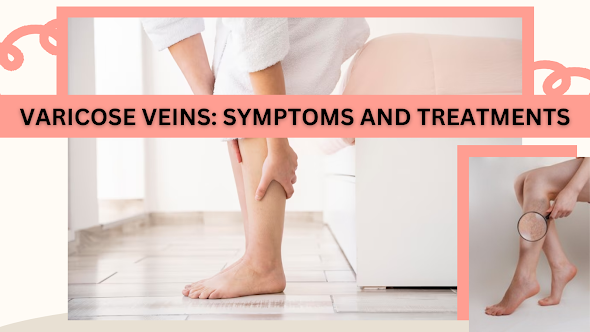Varicose Veins: Symptoms and Treatments
Varicose veins are enlarged, swollen, and twisted veins that commonly occur in the legs and feet. They develop when the valves inside the veins become weak or damaged, leading to a condition called venous insufficiency. These valves are responsible for ensuring proper blood flow in the veins by preventing blood from flowing backward.
When the valves fail to function properly, blood can pool or collect in the veins, causing them to stretch, bulge, and become varicose. The affected veins may appear dark blue or purple and often protrude above the surface of the skin. Varicose veins can be unsightly and may cause various symptoms such as aching, throbbing, heaviness, and discomfort in the legs. In some cases, they can lead to more serious complications like skin ulcers or blood clots.
Symptoms of Varicose Veins
Symptoms of varicose veins can vary in severity and may include:
- Visible, swollen veins: Varicose veins are typically enlarged, twisted, and bulging veins that are visible on the surface of the skin, usually in the legs or feet.
- Discoloration: The affected veins may appear dark blue or purple.
- Aching or throbbing: Many individuals with varicose veins experience discomfort, such as aching or throbbing sensations in the affected areas.
- Heaviness or fatigue: The legs may feel heavy, tired, or fatigued, especially after prolonged periods of standing or sitting.
- Itching or burning: Some people with varicose veins may experience itching or a burning sensation in the affected areas.
- Swelling: Swelling, particularly in the lower legs and ankles, can occur due to the impaired circulation associated with varicose veins.
- Muscle cramps: Cramping or muscle spasms, particularly at night, may be experienced in the affected leg muscles.
- Skin changes: Over time, varicose veins can lead to skin changes, including dryness, thinning, inflammation, and the development of ulcers or sores in severe cases.
It's important to note that not everyone with varicose veins will experience symptoms. However, if you are concerned about your veins or experiencing any discomfort, it is advisable to consult a Varicose Veins Doctor in Coimbatore for an accurate diagnosis and appropriate treatment options.
Treatments for Varicose Veins
There are several treatment options available for varicose veins. The choice of treatment depends on the severity of the condition and the individual's specific needs.
Some common treatment options include:
- Lifestyle Changes: Making certain lifestyle modifications can help alleviate symptoms and slow down the progression of varicose veins. These include regular exercise, maintaining a healthy weight, avoiding prolonged periods of standing or sitting, elevating the legs when resting, and wearing compression stockings.
- Sclerotherapy: This is a common non-surgical treatment option. A solution is injected into the affected veins, causing them to collapse and gradually fade away over time. Sclerotherapy is effective for smaller varicose veins and spider veins.
- Endovenous Ablation Therapy: This procedure involves using heat or laser energy to seal off and close the affected veins. It is typically performed on larger varicose veins. The two main types of endovenous ablation therapy are laser ablation and radiofrequency ablation.
- Vein Stripping: In more severe cases, where the varicose veins are large and causing significant discomfort, vein stripping may be recommended. It involves surgically removing the affected veins through small incisions. This procedure is usually performed under general or regional anesthesia.
- Ambulatory Phlebectomy: This minimally invasive surgical procedure is suitable for removing surface varicose veins. Small incisions are made to extract the affected veins using a special hook-like tool.
- Endoscopic Vein Surgery: In rare cases where ulcers or severe skin changes are present, endoscopic vein surgery may be required. A thin tube with a camera is inserted into the affected vein, allowing the surgeon to visualize and remove it through small incisions.
It's important to consult with a Varicose Veins Specialist in Coimbatore to determine the most suitable treatment option for your specific condition. They will consider factors such as the size and location of the varicose veins, your overall health, and any underlying medical conditions before recommending the appropriate course of action.



.png)
Comments
Post a Comment